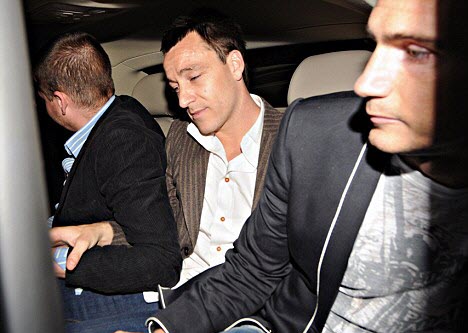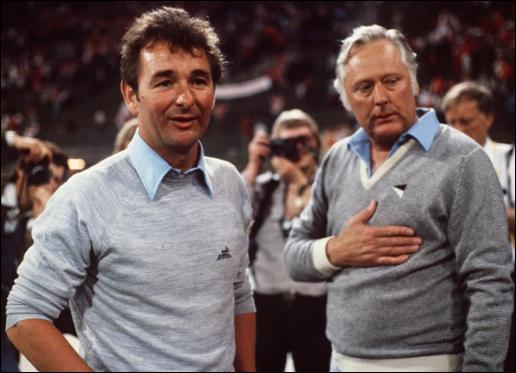Football/ capitalist realism/ utopia
Tue. July 6, 2010Categories: Abstract Dynamics
Actually, now seems like the time to post up this text on football and utopia I wrote last year for the Pura Vida project organised by Mark Gubbs and Hinterlands in Nottingham. It now reads like an anticipatory engagement with some of Eagleton’s arguments. Believe it or not, the text was pasted up on a billboard for a week (very Ballardian). Sadly, I didn’t get a chance to see it.

Football and neoliberal anti-utopianism
English football, the writer Robin Carmody argued on his live journal page, is a metaphor for precisely what the neoliberals have done to England itself
But it’s more than a metaphor. Football has been at the forefront of the total re-engineering of English culture, society and economy wrought by neoliberalism over the last thirty years. Neoliberalism presented itself as supremely realistic – as the only possible realism. It told us that utopia is impossible because there is no such thing as society, only individuals pursuing their own interests. What better image of this anti-utopianism is there than the Premiership, with its imperious, untouchable elite of clubs, its synergy with multinational media conglomerates, its conspicuously consuming players, its super-predatory club owners buying success like they are buying another yacht? Competition, exploitation, the strong lording it over the weak, paparazzi snaps of the fabulously wealthy masters of the universe players exiting nightclubs, flashing their very new money: football as anti-egalitarian Nietzschean combat. Forget utopia: dream, instead – if youre young – of eventually becoming like this, of owning these Cheshire mansions, of getting a cyborg-slick WAG; or if youre too old to ever lace up those ultrabranded boots, get used to being inferior, to never making it – dream instead of media-transfiguration via reality TV, or of a lottery win
Yet the Premiership is often treated as if it were a cause rather than an effect. In the lack of a coherent, general critique of capitalism, complaints about the inflation of players wages make no sense. After all, it is not public money being redistributed. Players spiralling wages are a consequence of the very market dynamics that, until last years bank crisis, were held to be sacrosanct. You can detect a sour anti-working class resentment – shared by self-hating elements of the working class itself – in the attack on footballs undeserving rich. But all of this – the players high wages, the exorbitant ticket prices – is an effect of footballs total subsumption into post-Fordist capital. But what if it wasnt like this? What if there had been another way?
Footballs lost utopias (in Nottingham)

There’s a poignant moment in Duncan Hamilton’s biography of Brian Clough – also recounted in David Peace’s The Damned Utd – when Clough and Peter Taylor (who wanted the ship-builders to earn as much as the ship-owners) go to see Harold Wilson speak and come away glowing with the white heat of Old Labour optimism, fired up by the prospect of a new era for the proletariat. You could hear the passion for change in what he said, Clough told Hamilton. We went back to Taylors house burning with it ourselves. Its like a scene from Our Friends In The North: Our Friends In The Midlands, perhaps. The future that Clough and Taylor anticipated would of course never arrive. Theres a parallel, perhaps, with another achingly painful scene in Hamiton’s book: Peter Taylor speaking after Forests second victory in the European cup, proclaiming that this was only the beginning… What in fact lay ahead was underachievement and overpriced players, decline and mediocrity, the final dissolution of the volatile partnership between Clough and Taylor, a rift opening up between the two men that would remain bitter until Taylor’s death. Who of us can identify when the moment of our greatest triumph has already passed? And how bearable would life be if we could?
If the brave new world wouldn’t arrive for the working class, it did arrive for Clough personally. Instead of being at the vanguard of a newly assertive working class, Clough’s period of greatest success coincided with the ebb tide of postwar proletarian collectivism. Clough was sometimes sneered at as a champagne socialist because he saw no contradiction between being a leftist and achieving success. Like many born poor, Clough was never able to fully believe that he had finally vanquished poverty from his life – hence, all those TV appearances, ghosted columns and the bung-rumours. In his review of The Damned Utd for The Guardian, Chris Petit argued that Clough embodied many of the forthcoming dilemmas of Thatcher’s Britain, his career a constant argument between self-proclamation and partnership, between probity and the demon drink, between financial irregularity and the belief that football was about more than acquisition. The Premiership terminated this, finally destroyed what was left of Cloughs crumbling world – a world in which working class managers could outwit and overcome puffed-up patrician patriarchs, a world in which unfancied provincial clubs could outdo the established colossuses – and his final decline was all-too punctual. With Clough an ailing Lear at the helm, Forest were relegated in 1993, at the end of the Premier League’s first season.
The end of an era
May 2009. Flamboyant Barcelona outplay Manchester United in the European Champions League final. United have come to represent the harsh capitalist reality principle of modern football. Only the already-successful and the wealthy can win. Fans dream now not of their club being revivified by some Brian Clough-like managerial genius, but of it being saved by the largesse of a bored plutocrat. Barcelona famously have no shirt sponsor, and display the logo of UNICEF on their jerseys. Uniteds shirt sponsor is AIG, the insurance company at the heart of the financial crisis (according to The Economist, AIGs tentacles reach into every part of the economy.) The neoliberal anti-utopia disintegrated with the bank bail-outs, even though it survives in an undead form as a set of defaults which continue to dominate social reality.
A non-profit making association owned and controlled by its members, Barcelonas slogan is more than a club. Do Barca, with their foundations and educational activities, give a hint as to how football might operate in a utopia? Proletarian artistry
the beauty of teamwork, competition, yes, but not the dog-eat-dog combat of capitalist realism
There could surely be no utopia that didnt include something like this
[…] originalmente como “Football/ realism capitalist/ utopía” el 6 de julio del 2010 por el fallecido autor Mark Fisher, en su blog […]